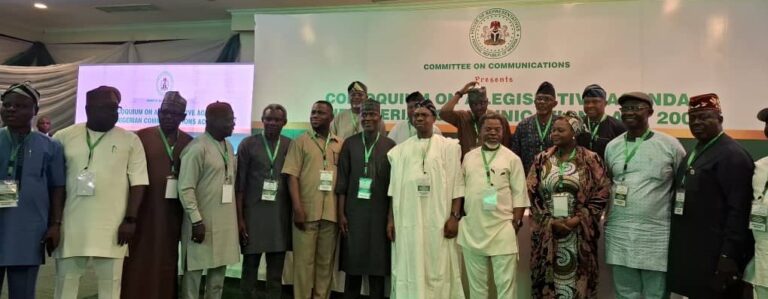By Martin Ekpeke
The Nigerian Communications Commission (NCC) has initiated a move to engage the National Assembly in a comprehensive review of the existing Nigerian Communications Act 2003 to ensure it effectively accommodates the rapid advancements in Artificial Intelligence (AI), Blockchain technology, and other emerging technologies.
At a 2-day colloquium started in Lagos today, hosted by the Federal House of Representatives Committee on Communications in collaboration with the NCC, the Executive Vice Chairman of the NCC, Dr. Aminu Maida, emphasized the timeliness and essential nature of this collaborative undertaking.
Dr. Maida highlighted that the swift progress in AI, blockchain, and other cutting-edge innovations, coupled with persistent challenges such as the digital divide, infrastructure deficits, cybersecurity threats, and economic pressures, necessitates a thorough reassessment of the existing legal framework.
“We firmly believe that the proposed amendments to the Act possess the potential to bridge the existing digital divide, foster the adoption of transformative technologies, bolster cybersecurity measures, stimulate digital entrepreneurship, and ultimately position Nigeria as a prominent player in the global digital economy,” Dr. Maida stated at the two-day colloquium themed: ‘22 Years After: Reassessing the Nigerian Communications Act – Challenges, Opportunities, and Future Directions for a Digital Nigeria.’
He further noted that the collaborative spirit between the NCC and the National Assembly, alongside the active involvement of industry stakeholders, offers a promising path toward a revised Act that is truly equipped for Nigeria’s digital future.
In his welcome address, the Chairman of the House of Representatives Committee on Communications, Hon. Peter Akpatason, echoed the urgency and importance of reassessing the 2003 Act.
Hon. Akpatason acknowledged the significant role the Act played in shaping Nigeria’s telecommunications landscape and driving progress across various sectors, including e-commerce, e-medicine, and mobile banking. However, he stressed the continued existence of a substantial digital divide, where a significant portion of the Nigerian population still lacks access to essential digital services.
 According to Hon. Akpatason, this stark reality underscores the urgent need to address infrastructural limitations and affordability barriers by revising the Act to incorporate emerging technologies like 5G, AI, and blockchain, thereby ensuring its flexibility and adaptability to evolving market conditions.
According to Hon. Akpatason, this stark reality underscores the urgent need to address infrastructural limitations and affordability barriers by revising the Act to incorporate emerging technologies like 5G, AI, and blockchain, thereby ensuring its flexibility and adaptability to evolving market conditions.
He also advocated for the implementation of strategies that promote digital entrepreneurship, innovation, and investment through incentives, funding opportunities, and skills development programs, urging active participation from all stakeholders to cultivate an inclusive, innovative, and prosperous digital economy for all Nigerians.
Similarly, the Speaker of the House of Representatives, Hon. Abbas Tajudeen, reinforced the legislative commitment to reforming and refocusing Nigeria’s communication sector in his remarks, which were delivered by Hon. Ibrahim Ayokunle Isiaka, the Deputy Chief Whip of the Federal House of Representatives.
Hon. Tajudeen underscored the critical role of communication in both economic and social development, referencing compelling statistics from the World Bank and the OECD that demonstrate the strong correlation between broadband penetration and GDP growth.
The Speaker highlighted the transformative impact of digital platforms on market penetration and development, citing the rise of e-commerce giants and the increasing accessibility of financial services through digital banking and payment systems as prime examples.
“The review of the Nigerian Communications Act 2003 aligns with the 10th House’s legislative agenda to strengthen existing laws to address emerging challenges,” he stated, expressing optimism that the colloquium would yield valuable insights to guide the amendment process, ultimately leading to a more effective and future-proof regulatory framework for Nigeria’s communications sector.
This crucial move to engage the National Assembly in a comprehensive review of the Nigerian Communications Act 2003 recognizes the profound and rapid transformations occurring within the global telecommunications landscape, particularly the emergence and increasing significance of Artificial Intelligence (AI), Blockchain technology, and other cutting-edge innovations.
The impetus for this review is rooted in the remarkable growth witnessed in Nigeria’s telecommunications sector since the Act’s enactment, a period characterized by an exponential increase in mobile subscriptions and internet penetration, culminating in a substantial contribution to the nation’s Gross Domestic Product (GDP).




